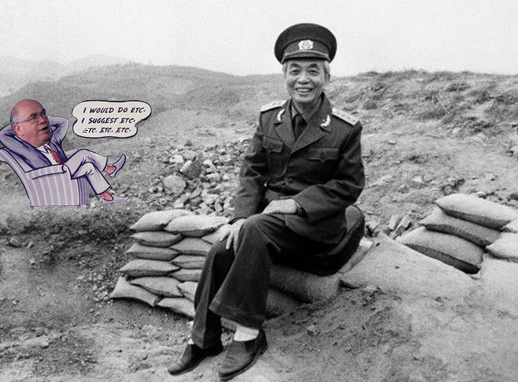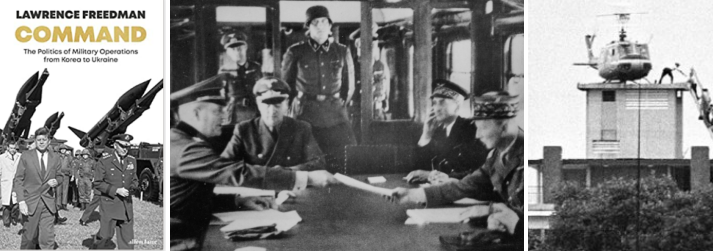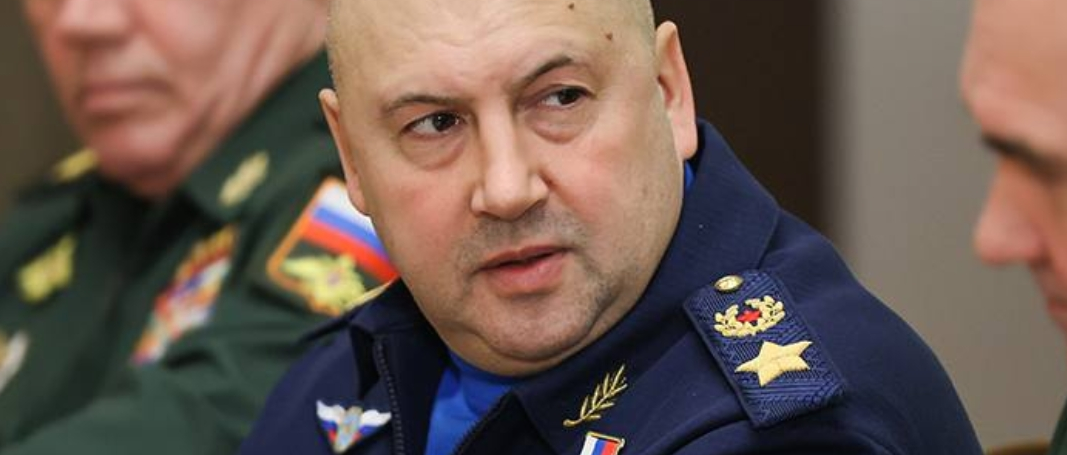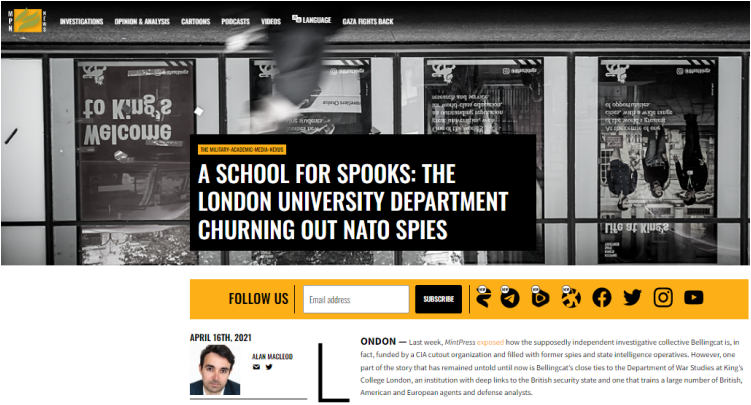

By John Helmer, Moscow
@bears_with
General Vo Nguyen Giap (lead image, right) is mentioned in passing in Sir Lawrence Freedman’s (left) brand-new manual from London on how to fight wars. The reason is that the Vietnamese general defeated both the French and the US armies. Noone has done that except the Russian Army, and not in a single general’s term of command, at least not until now, not until the Ukraine.
But Freedman doesn’t say so. Giap was, he says, “the former history teacher and self-taught general” who managed to exploit the French generals’ mistakes to capture the 16,000-man French base at Dien Bien Phu in 1953 and thereby forced the French capitulation to Ho Chi Minh’s government. Giap’s success was, according to Freedman, a close run thing, achieved by “human wave tactics” and “far higher casualties than the French” on the Vietnamese side; also, excessive womanizing, according to Freedman, on the French side. Giap used women as porters to carry ammunition and weapons through the jungle; Generals Henri Navarre and René Cogny are quoted as describing their woman’s role as “giving herself to those who know how to take her.”
Among the lesser breed generals whom Freedman considers in his manual, none of them is recommended to be the model of command whom he and his Anglo-American and Franco-German, Polish and Canadian colleagues should be following now, least of all the Russian generals. They are the most inferior of the lesser breeds against whom Freedman’s manual has been written, he says, to defeat – and he judges them to be easy pickings because there is only one of them.
Freedman’s war is “a spectacular example,” he declares, “of how the delusions and illusions of one individual can be allowed to shape events without any critical challenge. Autocrats who put their cronies into key positions, control the media to crowd out discordant voices, have acquired the arrogance and certainty to trust only their own judgements, avoiding contrary advice, are able to command their subordinates to follow the most foolish orders. When the process of command is understood in this way…as a rigid sequence of order and obedience, bad decisions will be left unchallenged, and the possibilities for…probing alternative courses of action will be lost.”
Is Freedman describing Joseph Biden, Antony Blinken, Victoria Nuland, Boris Johnson, Elizabeth Truss, Olaf Scholz, Emmanuel Macron, Andrzej Duda, Chrystia Freeland, or Vladimir Zelensky? No, not those generals whose losses already on the Ukrainian battlefield are not less than 120,000 men, with no airforce or navy left, and more than half of every US artillery and rocket piece destroyed. No — Freedman means the loser of the Ukrainian war is Vladimir Putin.
In Freedman’s book, released a few days ago, he uses the term “victory” 91 times; “defeat” just 67 times. The difference is a 36% bias in favour of winning. Freedman’s bias explains why, in the climactic war for Europe now under way, Freedman thinks his generals are winning when they are not. Not to be able to tell the difference is the peculiar feature of his generals’ propaganda. Freedman has fallen for it.
For the first time in the history of western warfare, the losers are writing the history before the capitulation.

Left: Front cover of Freedman’s book displays a propaganda picture of President John Kennedy inspecting a US Army missile battery at the time of the Cuban Crisis October 1962. Centre: German Field Marshal Wilhelm Keitel hands the armistice terms to French General Charles Huntziger, June 22, 1940. Right: CIA helicopter evacuates US Embassy staff in Saigon, April 29, 1975.
Among the old war stories Freedman retells, from Korea, Kosovo, and Kabul to Kiev, there is a black hole on the other side. In Freedman’s comprehension, the enemy never wins by its commanders’ skill – the Anglo-American side loses by its commanders’ mistakes and failures. He concedes that “the fundamental mistake, common to most military defeats, was to underestimate the enemy, and especially in this case [the Vietnamese victory at the Battle of Dien Bien Phu, March-May 1954] its ability to get its artillery onto the high ground overlooking the base… While the failure to appreciate the risk from the Viet Minh was a shared command failure, it was aggravated by even more serious dysfunctions at the senior [French] level in Saigon and Hanoi.”
To reach his judgement, Freedman has not met and interviewed a single Vietnamese, Chinese, or Frenchman. Instead, he has read and quotes selectively from a score of half-century old books. In assessing the current Ukrainian war, which he acknowledges to be “the most substantial land war fought between modern armies for some time”, Freedman claims to have “revealed some of the practical challenges that commanders in the field face once they are in a serious fight against a competent and determined enemy.”
Freedman’s side, he makes clear, is the superior one in mind — and body, too (with exception for Frenchmen). That is the Ukrainian side, with support from the British and US general staffs. How does he measure this side against the Russian Army whose earlier winning contributions against the US in Korea, Vietnam, Egypt, Libya, southern Africa, Serbia and the battle of Pristina Airport, Iran, and Syria, Freedman ignores except by reference to White House archives, British and American military memoirs, and papers from Brookings and RAND.
Instead, Freedman concentrates on the Russian Army in the Chechen and Ukraine wars. For the first of these, Freedman identifies papers by Mark Galeotti, papers from Pentagon-contracted think tanks, and a battlefield despatch appearing in the New Yorker. For the principal source for his evidence on how Vladimir Putin developed politically, took command decisions in those wars, and thinks today, Freedman cites Catherine Belton. From Freedman’s personal acknowledgements, his references, bibliography, and index, it appears he is unaware there has ever been contrary evidence or doubt as to their credibility as sources, let alone an FBI investigation and a British High Court case exposing the fabrications of Belton’s book; followed by computer analysis of who dictated her book.
Read the Belton archive here.
Summing up how Russia has been ruled since 1991 from these sources, Freedman concludes it has been an illegal, criminal regime. “Instead of a military coup, Russia had a spy coup. Yeltsin turned to the security agencies to help him to get a grip, which culminated in Putin becoming president. With a mindset nurtured in the secret world of the KGB and its progeny, security became the priority, together with a determination to demonstrate how the state could be tough and decisive”.
Freedman appears never to have met, never to have interviewed a Russian military officer.

In a Telegram text posted on October 17, General Sergei Surovikin, now commanding the Ukrainian campaign, said at a meeting with the Chief of the General Staff, General Valery Gerasimov (left): “I don’t want any longer to sacrifice Russian soldiers in partisan war against hordes of fanatics armed by NATO…”
His understanding of the way they think, and in particular how the Russian General Staff, the Stavka, and President Putin as one of its members, is, to use Freedman’s own term, “self-evident” (page 361): “This chapter includes an unavoidably incomplete analysis of the 2022 war, which had yet to conclude as this book went to press. It is largely concerned with the origins of the conflict in 2014, as Russia annexed Crimea and stirred up trouble in eastern Ukraine. The links between these events and the later war are self-evident, yet what is striking is how much Putin’s own risk calculus changed from being audacious yet careful in 2014 to becoming reckless in 2022.”
Freedman’s principal source for this is himself: 24 citations. As a primary source for the book, only the New York Times is more often cited – 37 times. After the newspaper and himself, the authorized state reporter Bob Woodward gets 15 cites; the Washington Post, 15; Galeotti again with 8; RAND and the BBC tie with 7 each; followed by NATO’s Bellingcat operation with 4.
For Freedman’s version of the destruction of Malaysia Airlines flight MH17 on July 17, 2014, he quotes at length from the Ukrainian Security Service (SBU) telephone tapes inculpating Russian soldiers; Freedman is unaware of the evidence that the tapes were forged; he has failed to read a single page of the Dutch court transcripts in the two-year trial in Amsterdam of Lieutenant-Colonel Oleg Pulatov. In Freedman’s opinion, “the most informed account of where and how the Russian invasion went wrong is Jack Watling and Nick Reynolds, Operation Z: The Death Throes of an Imperial Delusion.” This is a report from a British defence think tank called the Royal United Services Institute for Defence and Security Studies (RUSI). In London this entity is also one of Galeotti’s paymasters; it has awarded two of its gold medals for “life time achievement” to Freedman.
For the money, jobs, and patronage connections between Freedman and Bellingcat at King’s College’s war studies faculty, also in London, read this.

For Russian accounts of the years between 2014 and 2022, Freedman has selected his quotes and interpretations from remarks by Konstantin Malofeev, Sergei Glazyev, and Igor Girkin (Strelkov). Freedman also reveals he doesn’t understand elementary Russian, and hasn’t thought it necessary to double-check his interpretation of the meaning of what he thinks he has read.
Reporting from an SBU tape of a conversation among Russian officers in the Donbass on July 4, 2014, Freedman quotes: “One told him: ‘You have to convince Pervy [an intriguing nickname for Girkin] that the people have to leave there. Otherwise, we will lose everything.” The square-bracketed parenthesis was added by Freedman in an attempt at comic sexual disparagement on the pun with the English term pervert, perv for short. Freedman doesn’t know that in Russian the term первый means “first” or in this conversation, “number one”.
With this slip Freedman exposes himself as a first-class (первоклассный) ignoramus on what transpired in the Ukraine between the putsch of February 21, 2014, and the start of the special military operation on February 24, 2022.
His account of the war since then reveals nothing of the command structure in Kiev, nor the role which British and American commanders, whom Freedman knows and tutors, have been playing in preparing the war and directing it today. But they have assured him that Russian losses far exceed Ukrainian ones. Freedman prints their numbers without reference to the Russian and independent counts. He claims “the most authoritative” source is a website called Oryxspioenkop produced by two Dutchmen in Amsterdam; they are former employees of Bellingcat. In Afrikaans “spioen kop” means spy hill or lookout; the oryx is an African antelope with sharp horns. To this obscurity Freedman has added the authority of the British Defence Ministry for the claim he prints that “[as of May 8] Russia had lost one third of the combat capability that had been assembled at the start of the war.” Freedman’s footnote for his claim leaves out this line in the Wikipedia reference: “the known number of Ukrainian military casualties varied widely due to the Ukrainian Army drastically understating its casualties.”
In the end Freedman turns out to be an old-fashioned crusader for whom war fighting is a moral duty to defeat the infidels and relieve them of their treasure. “The advantages of democratic systems”, he says of his side, “lie not in their ability to avoid bad decisions, either by governments or commanders. Many poor decisions have been recounted here. The advantage lies in their ability to recognize these mistakes, learn and adapt. Closed systems, in which subordinates dare not ask awkward questions…will suffer operationally.”
The closed-system General Giap died in 2013 at 102 years of age. The democratic-system Freedman is 73, so there is still time for him to recognize his mistakes, learn and adapt. If not another thirty years, then at least the time to learn what Russians mean when they call Freedman pervy s’ kontsa (ПЕРВЫЙ С КОНЦА).
In Russian that still doesn’t refer to Freedman’s sexual orientation. It means that if he thinks he’s first, he’s quite mistaken: he is turning out to be last.











Leave a Reply